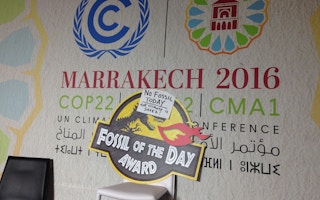This month, we will have a chance to chart a course toward a stronger, safer global society, where power belongs to the many, not to the few, and where those who have run roughshod over our environment, human rights, and public health will be held accountable. I am not talking about the United States’ presidential election.
To be sure, the US election will be immensely consequential; but endless punditry and horserace politics have obscured two groundbreaking events that begin on November 7: meetings of the parties to the World Health Organization Framework Convention on Tobacco Control (FCTC) and the United Nations Framework Convention on Climate Change (UNFCCC).
Superficially, international law lacks the drama of a presidential race, and can undoubtedly seem stuffy at best, and irrelevant at worst. But if one digs a little deeper, one finds an almost Shakespearean struggle between democracy and unbridled greed. At each conference this month, the international community will make decisions that will affect the outcome of this struggle, and which could begin to solve some of today’s most vexing global issues.
Both the FCTC and the UNFCCC allow for governments to rein in global corporations’ unchecked power, which is a root cause of many other problems, from economic inequality to social injustice and broken democratic systems.
Global corporations are enormous, and their influence affects almost every aspect of our lives. To understand the reach of their power, one must look no further than the billions of dollars they spend on elections; their lobbying to gut worker and environmental protections in trade agreements such as the Trans-Pacific Partnership and the Transatlantic Trade and Investment Partnership; and fossil-fuel corporations’ relentless drive to derail climate-change policy.
Global corporations have disproportionate power because they can operate across national borders, which means that no single local or national government can effectively regulate them. The crucial function of international frameworks such as the FCTC and UNFCCC is to provide concrete tools for governments to set national policies on issues ranging from public health to climate change and global inequality.
For example, Colombia was a stronghold for the tobacco corporation Philip Morris International two decades ago, and comprehensive tobacco-control legislation in that country was long unthinkable. But in 2009 – just six years after the World Health Organization adopted the FCTC and 15 months after Colombia ratified it – the Colombian government enacted one of the strongest tobacco-control laws in the world.
Likewise, governments worldwide are adopting measures that are proven to reduce smoking rates and save lives, including graphic health warnings, marketing restrictions, and laws requiring tobacco products to be sold in unbranded packaging.
“
International law lacks the drama of a presidential race, and can undoubtedly seem stuffy at best, and irrelevant at worst. But if one digs a little deeper, one finds an almost Shakespearean struggle between democracy and unbridled greed.
But the FCTC’s work is not done, and governments are now pushing for legal liability to be a part of national-level corporate-accountability frameworks. If they are successful in negotiations at the FCTC conference this month, governments will have the tools they need to make Big Tobacco pay for the damage it has done. Such an outcome would mean that governments could recoup hundreds of billions of dollars in tobacco-related health-care costs and force the release of internal industry documents.
The FCTC is effective because it includes a hard-won provision that explicitly prohibits corporations from influencing policymaking. At the UNFCCC conference, some governments will hold up the FCTC as a strong precedent to argue that the fossil-fuel industry must be excluded from ongoing climate negotiations, owing to its conflicts of interest with sound climate policy.
Industries responsible for climate change must not be entrusted to solve it. Only by removing them from the equation can we implement truly groundbreaking measures – such as renewable-energy systems owned and operated by communities – that put people and our planet’s survival above the industry’s bottom line.
For as long as we’ve had public regulatory institutions, corporate interests have sought to co-opt them. Big Tobacco, Big Oil, Big Food, and Big Pharma have tried to bully, buy, and bribe their way into our public international spaces, all with the same goal in mind: to fend off regulation that would disrupt business as usual. Costs to human life or the planet rarely enter into their calculus.
Democracy advocates in civil society and government have managed to push back against global corporations, but much of their progress hangs in the balance this month. Will attendees at the FCTC and UNFCCC conferences defend democratic principles, or will they defer to big business?
The United Kingdom’s “Brexit” referendum notwithstanding, there is no denying that we live in a truly global world. When the causes of our biggest problems are global, our solutions must be as well, which requires that we first address the fundamental issue of corporate interference. The possibilities of what can be achieved by bringing international law to bear are too promising to ignore.
Kelle Louaillier is President of Corporate Accountability International.
Copyright: Project Syndicate, 2016.
www.project-syndicate.org









